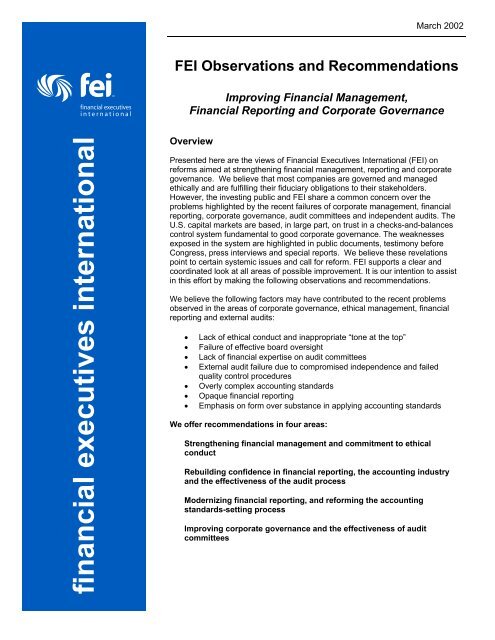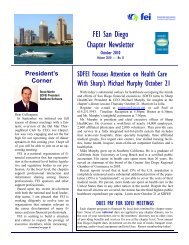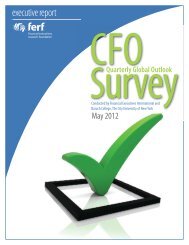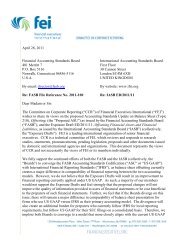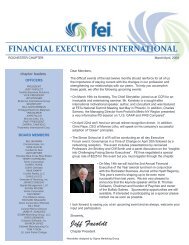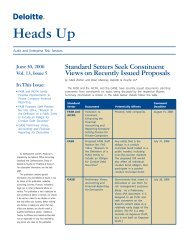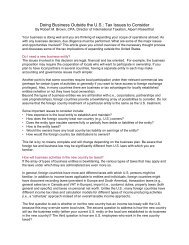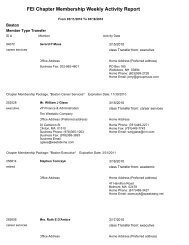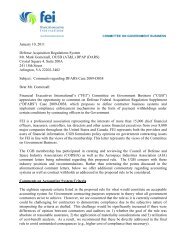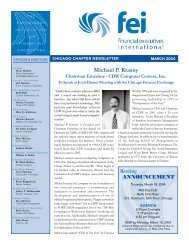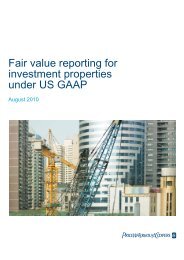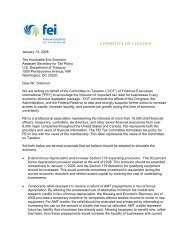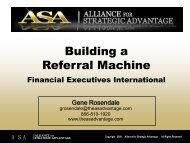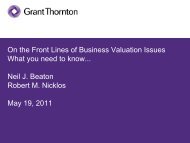on our website - Financial Executives International
on our website - Financial Executives International
on our website - Financial Executives International
Create successful ePaper yourself
Turn your PDF publications into a flip-book with our unique Google optimized e-Paper software.
financial executives internati<strong>on</strong>al<br />
FEI Observati<strong>on</strong>s and Recommendati<strong>on</strong>s<br />
Improving <strong>Financial</strong> Management,<br />
<strong>Financial</strong> Reporting and Corporate Governance<br />
Overview<br />
Presented here are the views of <strong>Financial</strong> <strong>Executives</strong> Internati<strong>on</strong>al (FEI) <strong>on</strong><br />
reforms aimed at strengthening financial management, reporting and corporate<br />
governance. We believe that most companies are governed and managed<br />
ethically and are fulfilling their fiduciary obligati<strong>on</strong>s to their stakeholders.<br />
However, the investing public and FEI share a comm<strong>on</strong> c<strong>on</strong>cern over the<br />
problems highlighted by the recent failures of corporate management, financial<br />
reporting, corporate governance, audit committees and independent audits. The<br />
U.S. capital markets are based, in large part, <strong>on</strong> trust in a checks-and-balances<br />
c<strong>on</strong>trol system fundamental to good corporate governance. The weaknesses<br />
exposed in the system are highlighted in public documents, testim<strong>on</strong>y before<br />
C<strong>on</strong>gress, press interviews and special reports. We believe these revelati<strong>on</strong>s<br />
point to certain systemic issues and call for reform. FEI supports a clear and<br />
coordinated look at all areas of possible improvement. It is <strong>our</strong> intenti<strong>on</strong> to assist<br />
in this effort by making the following observati<strong>on</strong>s and recommendati<strong>on</strong>s.<br />
We believe the following factors may have c<strong>on</strong>tributed to the recent problems<br />
observed in the areas of corporate governance, ethical management, financial<br />
reporting and external audits:<br />
• Lack of ethical c<strong>on</strong>duct and inappropriate “t<strong>on</strong>e at the top”<br />
• Failure of effective board oversight<br />
• Lack of financial expertise <strong>on</strong> audit committees<br />
• External audit failure due to compromised independence and failed<br />
quality c<strong>on</strong>trol procedures<br />
• Overly complex accounting standards<br />
• Opaque financial reporting<br />
• Emphasis <strong>on</strong> form over substance in applying accounting standards<br />
We offer recommendati<strong>on</strong>s in f<strong>our</strong> areas:<br />
Strengthening financial management and commitment to ethical<br />
c<strong>on</strong>duct<br />
Rebuilding c<strong>on</strong>fidence in financial reporting, the accounting industry<br />
and the effectiveness of the audit process<br />
Modernizing financial reporting, and reforming the accounting<br />
standards-setting process<br />
Improving corporate governance and the effectiveness of audit<br />
committees<br />
March 2002
Recommendati<strong>on</strong>s<br />
Strengthening <strong>Financial</strong> Management<br />
and Commitment to Ethical C<strong>on</strong>duct<br />
Recommendati<strong>on</strong> 1: All financial executives should adhere to a specialized code<br />
of ethical c<strong>on</strong>duct.<br />
FEI recommends that all senior financial professi<strong>on</strong>als be required to adhere to a str<strong>on</strong>g ethical code<br />
of c<strong>on</strong>duct. For many years, members of FEI have signed such a code, thus committing to its principles.<br />
That code has been updated recently to include a call for all financial executives to acknowledge their<br />
affirmative duty to proactively promote ethical c<strong>on</strong>duct in their organizati<strong>on</strong>s.<br />
Whether or not they are members of FEI, all finance professi<strong>on</strong>als should adhere to a code of ethical<br />
c<strong>on</strong>duct c<strong>on</strong>taining all the elements of the FEI Code of Ethics. The Code states, for example, that<br />
financial arrangements involving actual or apparent c<strong>on</strong>flicts of interest should be avoided.<br />
FEI recommends that all senior financial officers, accounting officers, c<strong>on</strong>trollers, treasurers and chief<br />
investor relati<strong>on</strong>s officers annually sign a code c<strong>on</strong>taining all the elements of the FEI Code of Ethics<br />
and deliver it to their board or the board’s designated committee. Further, we expect that best practice<br />
in this area will be that all finance, accounting, tax and investor relati<strong>on</strong>s pers<strong>on</strong>nel annually sign such<br />
a code.<br />
The FEI Code is attached to this document as Appendix A.<br />
FEI str<strong>on</strong>gly recommends that C<strong>on</strong>gress and the SEC implement regulati<strong>on</strong>s that call for stock<br />
exchanges and markets to implement this recommendati<strong>on</strong> through listing agreements.<br />
Recommendati<strong>on</strong> 2: Companies should actively promote ethical behavior and<br />
provide employees with the means to report perceived violati<strong>on</strong>s of ethical<br />
standards without fear of reprisal.<br />
FEI str<strong>on</strong>gly endorses practices by which all companies adopt a code of c<strong>on</strong>duct for their employees<br />
and c<strong>on</strong>duct regular training sessi<strong>on</strong>s to assure understanding and compliance. We believe companies<br />
should provide support and broad protecti<strong>on</strong> to employees reporting code of c<strong>on</strong>duct violati<strong>on</strong>s. Under<br />
such a framework, companies should:<br />
• Adopt a written code of c<strong>on</strong>duct for all employees<br />
• C<strong>on</strong>duct employee orientati<strong>on</strong> and training with respect to the code<br />
• Provide employees with a mechanism (such as a hotline or help-line) to surface c<strong>on</strong>cerns<br />
about compliance with laws and regulati<strong>on</strong>s<br />
• Adopt procedures for voluntary disclosure of violati<strong>on</strong>s of laws<br />
• Participate in best practices forums<br />
• Inform the public of the active commitment to implement these steps<br />
We enc<strong>our</strong>age all companies to set up “hotline” channels, providing employees with the means to report<br />
perceived violati<strong>on</strong>s of the code or of the law without fear of reprisal. Additi<strong>on</strong>ally, employees should be<br />
made aware of these lines of communicati<strong>on</strong> and be assured that the s<strong>our</strong>ce of all calls will be kept<br />
c<strong>on</strong>fidential. Calls should go directly to a pers<strong>on</strong>, facilitator or committee specifically identified by the<br />
company’s board. That designated pers<strong>on</strong> or entity should screen each call and initiate appropriate<br />
acti<strong>on</strong> within the company. The company’s board of directors should be informed of calls made and<br />
their dispositi<strong>on</strong> <strong>on</strong> a regular basis.<br />
2<br />
<strong>Financial</strong> <strong>Executives</strong> Internati<strong>on</strong>al
Recommendati<strong>on</strong> 3: Qualificati<strong>on</strong>s of the principal financial officer and principal<br />
accounting officer.<br />
Management, in support of the audit committee and board of directors, should designate a principal<br />
financial officer and a principal accounting officer as those terms are used in the Securities Act of 1933.<br />
FEI believes the qualificati<strong>on</strong>s and roles of such pers<strong>on</strong>s should include the following:<br />
• The principal financial officer should be that pers<strong>on</strong> with overall resp<strong>on</strong>sibility for the<br />
finance functi<strong>on</strong> within the reporting company, and should have knowledge in all areas<br />
of finance including, at a minimum, the requisite knowledge proposed for the financial<br />
experts of audit committees. The principal financial officer should be resp<strong>on</strong>sible for<br />
upholding compliance with ethical standards within the finance functi<strong>on</strong>.<br />
• The principal accounting officer should be a licensed public accountant or possess<br />
equivalent knowledge and experience, and should be current and knowledgeable in the<br />
understanding of GAAP and the SEC’s rules and regulati<strong>on</strong>s governing the preparati<strong>on</strong><br />
and audit of financial statements.<br />
• The principal financial officer should report to the chief executive officer, and the principal<br />
accounting officer should report to the principal financial officer. It is further recommended<br />
that the principal financial officer and/or the principal accounting officer meet with the audit<br />
committee periodically (quarterly) to review significant financial statement issues, including<br />
key judgments, estimates and disclosure matters.<br />
Rebuilding C<strong>on</strong>fidence in <strong>Financial</strong> Reporting, the Accounting<br />
Industry and Effectiveness of the Audit Process<br />
Recommendati<strong>on</strong> 4: Create a new oversight body for the accounting professi<strong>on</strong><br />
staffed with finance and accounting professi<strong>on</strong>als.<br />
Enhanced oversight of public accounting firms by an independent body would increase public<br />
c<strong>on</strong>fidence in the audit process and effectiveness of the audit quality c<strong>on</strong>trol process. This oversight<br />
board should be sp<strong>on</strong>sored by the SEC and, recognizing the technical nature involved and the need to<br />
adequately understand the audit process, the majority of its members should be executives with<br />
knowledge in accounting and finance. These individuals should be clearly independent of public<br />
accounting firms or other audit industry organizati<strong>on</strong>s. We do not believe that a majority of members<br />
should be drawn from the audit professi<strong>on</strong>.<br />
This oversight board should oversee the peer review quality c<strong>on</strong>trol process of the audit firms.<br />
Furthermore, the peer reviewers should be accountable to the oversight board for the scope of review,<br />
findings, recommendati<strong>on</strong>s and corrective acti<strong>on</strong>s.<br />
We further recommend that a focused missi<strong>on</strong> and scope will enhance the effectiveness of this body.<br />
Therefore, this new body should be principally tasked with the job of audit industry oversight and<br />
discipline. As FEI c<strong>on</strong>tinues to support private-sector accounting standard setting, we believe that a<br />
separate and independent body should c<strong>on</strong>tinue to oversee the FASB.<br />
<strong>Financial</strong> <strong>Executives</strong> Internati<strong>on</strong>al 3
Recommendati<strong>on</strong> 5: Place restricti<strong>on</strong>s <strong>on</strong> certain n<strong>on</strong>-audit services supplied by the<br />
independent auditor.<br />
Even the appearance of a potential c<strong>on</strong>flict of interest may now undermine an auditor’s effectiveness.<br />
Therefore, we believe c<strong>on</strong>fidence in the integrity of the audit would be enhanced if certain n<strong>on</strong>-audit services<br />
were prohibited for audit clients. In this regard:<br />
• The independent auditor should no l<strong>on</strong>ger provide audit clients with internal audit services or<br />
c<strong>on</strong>sulting <strong>on</strong> computer systems used for financial accounting and reporting.<br />
• Advisory services should be prohibited wherever the audit firm could be put in a positi<strong>on</strong> of<br />
relying <strong>on</strong> the work product resulting from such services.<br />
• Tax advisory and compliance services, acquisiti<strong>on</strong> due diligence, audits of employee benefit<br />
plans and other statutory audits should be acceptable services for audit clients as they would<br />
not normally raise questi<strong>on</strong>s of c<strong>on</strong>flict of interest. In the unusual instance where such services<br />
could present questi<strong>on</strong>s of a c<strong>on</strong>flict of interest, such services should not be provided.<br />
Importantly, in additi<strong>on</strong> to the foregoing, we suggest that audit committees approve substantially all large<br />
n<strong>on</strong>-audit services. In so doing, the audit committee should c<strong>on</strong>sider the impact of such services <strong>on</strong> the overall<br />
independence of the audit firm.<br />
FEI also recommends that the SEC redefine the current classificati<strong>on</strong>s of audit and n<strong>on</strong>-audit services to<br />
assure that the guidance is clear and that the distincti<strong>on</strong> c<strong>on</strong>veys a complete and meaningful picture to<br />
investors in regard to the proper characterizati<strong>on</strong> of audit and n<strong>on</strong>-audit activities.<br />
Recommendati<strong>on</strong> 6: Restrict the hiring of senior pers<strong>on</strong>nel from the external auditor.<br />
FEI recommends that companies adopt policies that restrict the hiring of engagement audit and tax partners,<br />
or senior audit and tax managers, who have worked <strong>on</strong> the company’s audit for a period specified by the<br />
board of directors. FEI believes that this period should be no shorter than two years.<br />
Modernizing <strong>Financial</strong> Reporting and Reforming the<br />
Accounting Standards-Setting Process<br />
Recommendati<strong>on</strong> 7: Reform the <strong>Financial</strong> Accounting Standards Board (FASB).<br />
FEI recommends that a “Blue Ribb<strong>on</strong> Committee” be formed to address FASB reform. While we support<br />
c<strong>on</strong>tinuing private-sector standard setting through the FASB, substantive process and structural changes<br />
are l<strong>on</strong>g overdue. The Blue Ribb<strong>on</strong> Committee should complete its work promptly and produce initial<br />
recommendati<strong>on</strong>s within three m<strong>on</strong>ths of its formati<strong>on</strong>. The Committee should be guided by the basic<br />
principle of advancing financial reporting, notwithstanding divergent political interests. The Committee<br />
should address the following issues:<br />
• FASB Organizati<strong>on</strong><br />
– Board missi<strong>on</strong> statement<br />
– Size of board<br />
– Length of board member terms<br />
– Voting majority<br />
– Staff effectiveness, accountability and structure<br />
– Restricti<strong>on</strong>s <strong>on</strong> board member meetings (“Sunshine Rules”)<br />
• Timely Standard Setting<br />
– Timely standard setting with clearly defined priorities, objectives and milest<strong>on</strong>es<br />
– Agenda management and accountability<br />
4 <strong>Financial</strong> <strong>Executives</strong> Internati<strong>on</strong>al
• <strong>Financial</strong> Statement C<strong>on</strong>tent<br />
– A process for defining clear l<strong>on</strong>g-term objectives for financial statements produced<br />
under GAAP<br />
– Fair value accounting, in particular, needs to be addressed, given the absence of<br />
market values in many areas and the potential for such accounting c<strong>on</strong>cepts to create<br />
financial statement volatility<br />
• <strong>Financial</strong> Accounting Standards<br />
– Reassess the c<strong>on</strong>ceptual framework as the basis for standard setting<br />
– Assure practical implementati<strong>on</strong> of principle-based standards vs. specific, bright-line<br />
rules; examples of standard applicati<strong>on</strong> and financial interpretati<strong>on</strong>s based <strong>on</strong> principles<br />
underlying standard<br />
– Impact of planned globalizati<strong>on</strong> of accounting standards<br />
– Review existing standards and disclosures<br />
– Address the need to increase the participati<strong>on</strong> of the user and investment community<br />
and decrease tensi<strong>on</strong> with the preparer community<br />
Recommendati<strong>on</strong> 8: Modernize financial reporting.<br />
FEI expresses str<strong>on</strong>g support for the following improvements in financial reporting and recommends that<br />
committees be formed promptly to address these matters.<br />
• Improve Management’s Discussi<strong>on</strong> and Analysis (MD&A)<br />
– FEI should take the lead in developing best practices for MD&A disclosure utilizing<br />
2001 annual reports as a primary s<strong>our</strong>ce for data.<br />
• Implement "Plain English" financial reporting as the new language of professi<strong>on</strong>als involved<br />
in investor relati<strong>on</strong>s and financial statement preparati<strong>on</strong>.<br />
• Promote voluntary disclosures of business performance metrics<br />
– FEI recommends that companies c<strong>on</strong>sider providing Web-based reporting of key<br />
performance measures used by management and specific to the industry <strong>on</strong> a quarterly<br />
basis. (A possible s<strong>our</strong>ce for additi<strong>on</strong>al key performance measures is informati<strong>on</strong><br />
shared at analyst presentati<strong>on</strong>s.)<br />
– In order to enc<strong>our</strong>age the expansi<strong>on</strong> of reporting additi<strong>on</strong>al measures, it is essential that<br />
safe harbor rules be strengthened to specifically encompass the additi<strong>on</strong>al reporting.<br />
• Develop and complement Web-based financial reporting<br />
– Internet delivery of hierarchical financial reporting that employs scorecards, current key<br />
performance indicators and analytical tools offering differing accounting standards is the<br />
future. Industry, users and the SEC should move ahead aggressively to develop models<br />
of such reporting frameworks without reducing access for investors in the short term.<br />
– Mandatory Internet access to financial reports — public companies should make the<br />
informati<strong>on</strong> available <strong>on</strong> their Web sites c<strong>on</strong>current with SEC filings.<br />
– Voluntary business performance reporting, discussed above, may be more easily<br />
implemented through Web-based reporting.<br />
• Expanded use of reports <strong>on</strong> Form 8-K<br />
– Items typically included in these filings could be expanded; however, the SEC’s revised<br />
guidance should be “principle-based” and the current list of additi<strong>on</strong>al items to be<br />
disclosed should be presented <strong>on</strong>ly as “examples.”<br />
• Enhance filing requirements for foreign filers<br />
– Many foreign filers currently provide quarterly financial statements <strong>on</strong> a voluntary basis.<br />
FEI recommends that the SEC require foreign filers to file quarterly.<br />
<strong>Financial</strong> <strong>Executives</strong> Internati<strong>on</strong>al 5
6<br />
• Assess transiti<strong>on</strong> impact <strong>on</strong> paper documents<br />
– FEI does not suggest that hard copy mailings be eliminated in the near term. However,<br />
the c<strong>on</strong>tent of paper mailings to shareholders should be examined to determine what<br />
modificati<strong>on</strong>s can be made and over what timeframe.<br />
– <strong>Financial</strong> disclosure to shareholders via paper documents has vastly exceeded a user’s<br />
ability to digest it. The availability of public filings <strong>on</strong> the Web and analysis of informati<strong>on</strong><br />
accessed by users should assist in identifying what is c<strong>on</strong>sidered important. The<br />
resulting informati<strong>on</strong> could serve as a basis to expand the disclosures most often accessed<br />
and reduce those disclosures that are of little or no interest. This should improve<br />
understanding and communicati<strong>on</strong> while reducing costs to corporati<strong>on</strong>s and, ultimately,<br />
to the shareholders.<br />
Improving Corporate Governance and the<br />
Effectiveness of Audit Committees<br />
Recommendati<strong>on</strong> 9: Effective implementati<strong>on</strong> of the 1999 Blue Ribb<strong>on</strong> Panel<br />
Recommendati<strong>on</strong>s re audit committee financial experts.<br />
In 1999, the Blue Ribb<strong>on</strong> Panel <strong>on</strong> Audit Committee Effectiveness called for all audit committee members<br />
to be financially literate and for each committee to have at least <strong>on</strong>e financial expert.<br />
FEI recommends that the NYSE and the NASDAQ set higher standards for audit committee “financial<br />
experts.” These criteria should call for explicit experience requirements in the credentials of such experts.<br />
A financial expert should possess:<br />
• An understanding of Generally Accepted Accounting Principles (GAAP) and audits of financial<br />
statements prepared under those principles. Such understanding may have been obtained<br />
either through educati<strong>on</strong> or experience. We believe it is important for some<strong>on</strong>e <strong>on</strong> the audit<br />
committee to have a working knowledge of those principles and standards.<br />
• Experience in the preparati<strong>on</strong> and/or the auditing of financial statements of a company of<br />
similar size, scope and complexity as the company <strong>on</strong> whose board the committee member<br />
serves. The experience would generally be as a chief financial officer, chief accounting officer,<br />
c<strong>on</strong>troller or auditor of a similar entity. This background will provide a necessary understanding<br />
of the transacti<strong>on</strong>al and operati<strong>on</strong>al envir<strong>on</strong>ment that produces the issuer’s financial<br />
statements. It will also bring an understanding of what is involved in appropriate accounting<br />
estimates, accruals, reserve provisi<strong>on</strong>s, etc., and an appreciati<strong>on</strong> of what is necessary to<br />
maintain a good internal c<strong>on</strong>trol envir<strong>on</strong>ment.<br />
• Experience in the internal governance and procedure of audit committees, obtained either<br />
as an audit committee member, a senior corporate manager resp<strong>on</strong>sible for answering to the<br />
audit committee or an external auditor resp<strong>on</strong>sible for reporting <strong>on</strong> the executi<strong>on</strong> and results<br />
of annual audits.<br />
FEI str<strong>on</strong>gly recommends that C<strong>on</strong>gress and the SEC implement regulati<strong>on</strong>s that call for stock exchanges<br />
and markets to implement this recommendati<strong>on</strong> through listing agreements.<br />
<strong>Financial</strong> <strong>Executives</strong> Internati<strong>on</strong>al
Recommendati<strong>on</strong> 10: C<strong>on</strong>tinuing professi<strong>on</strong>al educati<strong>on</strong> for audit committee members.<br />
FEI recommends that all audit committee members attend c<strong>on</strong>tinuing educati<strong>on</strong> in areas of financial reporting,<br />
risk management and/or accounting. Training can be “in-house” or via an outside provider. FEI, the Nati<strong>on</strong>al<br />
Associati<strong>on</strong> of Corporate Directors or an equivalent entity should establish the minimum c<strong>on</strong>tent to be covered.<br />
Companies should disclose in the annual audit committee report whether members have undertaken such<br />
training. N<strong>on</strong>-audit committee directors are also urged to attend these sessi<strong>on</strong>s.<br />
Recommendati<strong>on</strong> 11: Periodic c<strong>on</strong>siderati<strong>on</strong> of audit committee chair rotati<strong>on</strong>.<br />
FEI recommends that boards of directors periodically evaluate the need to rotate the individual holding the audit<br />
committee chair. Such evaluati<strong>on</strong> may be d<strong>on</strong>e approximately every five years. FEI recognizes that outstanding<br />
audit committee chairs are valuable and difficult to replace. Yet there is also benefit in developing successors<br />
and additi<strong>on</strong>al financial experts <strong>on</strong> the audit committee. Therefore, rotati<strong>on</strong> and successor development may<br />
further strengthen the overall governance mechanisms within the board.<br />
Recommendati<strong>on</strong> 12: Disclosure of corporate governance practices.<br />
FEI recommends that all companies annually report their key corporate governance practices. Current best<br />
practice in many companies is to have a governance and nominating committee made up of independent<br />
directors.<br />
Closing<br />
FEI formed a task force of members to assemble this set of recommendati<strong>on</strong>s. The task force also had<br />
significant input from FEI’s Committee <strong>on</strong> Corporate Reporting. These recommendati<strong>on</strong>s were then reviewed<br />
and approved by FEI’s Executive Committee led by FEI Chairman David Young, CFO of Adaptec, Inc., and FEI<br />
Vice Chairman Ridge A. Braunschweig, CFO of Ori<strong>on</strong> Corporati<strong>on</strong>. FEI wishes to acknowledge and thank those<br />
involved in the preparati<strong>on</strong> of this report. Also, special thanks to the c<strong>on</strong>tributi<strong>on</strong>s of Barry Brooks, partner, Paul,<br />
Hastings, Janofsky & Walker LLP.<br />
TASK FORCE MEMBERS<br />
Philip D. Ameen Peter R. Bible<br />
General Electric Company General Motors Corporati<strong>on</strong><br />
Vice President and Comptroller Chief Accounting Officer<br />
Scott M. Boggs Frank J. Borelli<br />
Microsoft Corporati<strong>on</strong> Marsh & McLennan Companies<br />
Vice President and Corp. C<strong>on</strong>troller Retired CFO<br />
Fred Corrado David J. FitzPatrick<br />
The Great Atlantic & Pacific Tea Co., Inc. United Technologies Corp.<br />
Retired Vice Chairman & CFO SVP and Chief <strong>Financial</strong> Officer<br />
John P. Jessup Philip B. Livingst<strong>on</strong><br />
E.l. du P<strong>on</strong>t de Nem<strong>our</strong>s & Company <strong>Financial</strong> <strong>Executives</strong> Internati<strong>on</strong>al<br />
VP Finance and C<strong>on</strong>troller President and CEO<br />
Dennis D. Powell J. Pedro Reinhard<br />
Cisco Systems, Inc. Dow Chemical<br />
Vice President and Corporate C<strong>on</strong>troller EVP and Chief <strong>Financial</strong> Officer<br />
Bryan R. Roub David L. Shedlarz<br />
Harris Corporati<strong>on</strong> Pfizer, Inc.<br />
Senior Vice President and Chief <strong>Financial</strong> Officer EVP and Chief <strong>Financial</strong> Officer<br />
David H. Sidwell<br />
J.P. Morgan Chase & Co.<br />
Chief <strong>Financial</strong> Officer - Investment Bank © <strong>Financial</strong> <strong>Executives</strong> Internati<strong>on</strong>al 2002<br />
<strong>Financial</strong> <strong>Executives</strong> Internati<strong>on</strong>al 7
APPENDIX A: Code of Ethics of <strong>Financial</strong> <strong>Executives</strong> Internati<strong>on</strong>al<br />
FEI CODE OF ETHICS<br />
FEI’s missi<strong>on</strong> includes significant efforts to promote ethical c<strong>on</strong>duct in the practice of financial<br />
management throughout the world. Senior financial officers hold an important and elevated<br />
role in corporate governance. While members of the management team, they are uniquely<br />
capable and empowered to ensure that all stakeholders’ interests are appropriately balanced,<br />
protected and preserved. This Code provides principles to which members are expected to<br />
adhere and advocate. They embody rules regarding individual and peer resp<strong>on</strong>sibilities, as<br />
well as resp<strong>on</strong>sibilities to employers, the public and other stakeholders. Violati<strong>on</strong>s of FEI’s<br />
Code of Ethics may subject the member to censure, suspensi<strong>on</strong> or expulsi<strong>on</strong> under procedural<br />
rules adopted by FEI’s Board of Directors.<br />
All members of FEI will:<br />
Act with h<strong>on</strong>esty and integrity, avoiding actual or apparent c<strong>on</strong>flicts of interest in<br />
pers<strong>on</strong>al and professi<strong>on</strong>al relati<strong>on</strong>ships.<br />
Provide c<strong>on</strong>stituents with informati<strong>on</strong> that is accurate, complete, objective, relevant,<br />
timely and understandable.<br />
Comply with rules and regulati<strong>on</strong>s of federal, state, provincial and local governments,<br />
and other appropriate private and public regulatory agencies.<br />
Act in good faith, resp<strong>on</strong>sibly, with due care, competence and diligence, without<br />
misrepresenting material facts or allowing <strong>on</strong>e’s independent judgment to be<br />
subordinated.<br />
Respect the c<strong>on</strong>fidentiality of informati<strong>on</strong> acquired in the c<strong>our</strong>se of <strong>on</strong>e’s work except<br />
when authorized or otherwise legally obligated to disclose. C<strong>on</strong>fidential informati<strong>on</strong><br />
acquired in the c<strong>our</strong>se of <strong>on</strong>e’s work will not be used for pers<strong>on</strong>al advantage.<br />
Share knowledge and maintain skills important and relevant to c<strong>on</strong>stituents’ needs.<br />
Proactively promote ethical behavior as a resp<strong>on</strong>sible partner am<strong>on</strong>g peers, in the work<br />
envir<strong>on</strong>ment and the community.<br />
Achieve resp<strong>on</strong>sible use of and c<strong>on</strong>trol over all assets and res<strong>our</strong>ces employed or<br />
entrusted.<br />
10 Madis<strong>on</strong> Avenue<br />
PO Box 1938<br />
Morristown, NJ 07962-1938<br />
973.898.4600<br />
www.fei.org<br />
<strong>Financial</strong> <strong>Executives</strong> Internati<strong>on</strong>al


